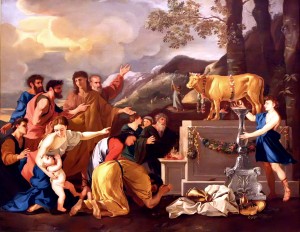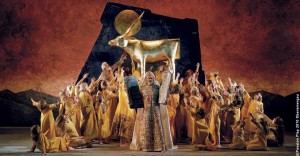Lord, I have given up my pride and turned away from my arrogance. I am not concerned with great matters or with subjects too difficult for me. Instead, I am content and at peace. As a child lies quietly in its mother’s arms, so my heart is quiet within me. Israel, trust in the Lord now and forever! (Psalm 131)
Last time I looked at this Psalm, I focused mainly on the author. It was King David, who was, shall we say, a reasonably successful King. Yet this is where his heart was. But this time I want to look at our hearts in relation to this Psalm.
This is one of the Songs of Ascents, there are 15, which are presumed to be the songs the Jews sang as they walked up to the Temple. If that is indeed the case, then the four David wrote were for future generations.
 So here we are walking to worship, and it’s probably a good time and place to give up your pride and turn away from your arrogance. God’s not particularly fond of either of those attributes:
So here we are walking to worship, and it’s probably a good time and place to give up your pride and turn away from your arrogance. God’s not particularly fond of either of those attributes:
Though the LORD is great, he cares for the humble, but he keeps his distance from the proud. (Psalm 136:6) It’s going to be tough to worship—to draw near—if the LORD is keeping His distance from you.
All who fear the LORD will hate evil. Therefore, I hate pride and arrogance, corruption and perverse speech. (Proverbs 8:13) Fear of the LORD means you understand Who He is and who you are. Pride and arrogance will not only NOT lead to understanding, it will put you in a dangerous place where God hates you.
Pride leads to disgrace, but with humility comes wisdom. (Proverbs 11:2) Disgrace or wisdom…it’s your choice.
Pride goes before destruction, and haughtiness before a fall. Better to live humbly with the poor than to share plunder with the proud. (Proverbs 16:18-19)
Disgrace, distance, and finally destruction and a fall.Can you see how impossible it is to have a  loving and worshipful relationship with Him, with all that against you? Pride exalts us beyond our place. Pride replaces God, or at best ignores Him. Pride completely re-writes our priorities. Pride makes us stupid. And the damage? Well that’s what the Psalms and Proverbs are talking about.
loving and worshipful relationship with Him, with all that against you? Pride exalts us beyond our place. Pride replaces God, or at best ignores Him. Pride completely re-writes our priorities. Pride makes us stupid. And the damage? Well that’s what the Psalms and Proverbs are talking about.
So what is it that grabs your attention? Great things? Difficult things? In and of themselves there is nothing wrong with either. But what if they become a distraction? What if they complicate too much? Find the simplicity of a child’s love and rest in the Lord.
Finally, lets not forget the context. You’re on your way to worship. God knows your heart. He knows when you’re being prideful and stupid, and he knows when you’re being humble like Jesus. He knows when you are near, and when you are distant. But what about your friends around you, as you’re going to worship? Are you being transparent so they can see that you’re struggling, and therefor could encourage you and strengthen you? Or are you keeping to yourself, hurting alone, being alone? It could be that your willingness to be open could bring about the healing you need, the truth you need, and so as your walking to worship, you’re actually being made ready for worship.
Some people have gotten out of the habit of meeting for worship, but we must not do that. We should keep on encouraging each other, especially since you know that the day of the Lord’s coming is getting closer. (Hebrews 10:24-25)
Draw near to God and He will draw near to you. (James 4:8) You might even find yourself held in His loving arms.

 Life often pulls us in opposite directions. Verse 2 in this Psalm is actually repeated by David in verse 6. And reading it, you may get the sense that David is patiently waiting on the LORD, just being still. But between verse 2 and 6 are verses 3 and 4, and here we discover the context:
Life often pulls us in opposite directions. Verse 2 in this Psalm is actually repeated by David in verse 6. And reading it, you may get the sense that David is patiently waiting on the LORD, just being still. But between verse 2 and 6 are verses 3 and 4, and here we discover the context: Context is critical when it comes to determine the actual meaning of a scriptural passage, and how it is to be applied. I love getting wrapped up in individual words and their meanings and nuances, but if I lose sight of the context, then I commit a grave error as described in the idiom: “Can’t see the forest for the trees”, which reminds us that we need perspective, we need context.
Context is critical when it comes to determine the actual meaning of a scriptural passage, and how it is to be applied. I love getting wrapped up in individual words and their meanings and nuances, but if I lose sight of the context, then I commit a grave error as described in the idiom: “Can’t see the forest for the trees”, which reminds us that we need perspective, we need context. The next phrase in the verse is one of scope: Everyone who trusts in them. I have said and written on numerous occasions, when there is a sweeping generalization, if it is God doing the sweeping, then it must be taken literally, for He alone can address or accomplish those generalizations. So when the Father says everyone, He means everyone. No wiggle room.
The next phrase in the verse is one of scope: Everyone who trusts in them. I have said and written on numerous occasions, when there is a sweeping generalization, if it is God doing the sweeping, then it must be taken literally, for He alone can address or accomplish those generalizations. So when the Father says everyone, He means everyone. No wiggle room. Last week we talked about the nature of idols. This week we look at the nature of their makers. And this is a very scary verse: Those who make them will become like them, everyone who trusts in them. In other words— dead. If you want to live, then you must believe in the living God. But if you don’t care about eternal life, then any idol serve its purpose, to lead you to death.
Last week we talked about the nature of idols. This week we look at the nature of their makers. And this is a very scary verse: Those who make them will become like them, everyone who trusts in them. In other words— dead. If you want to live, then you must believe in the living God. But if you don’t care about eternal life, then any idol serve its purpose, to lead you to death. When the Psalmist speaks of “Their”, he is speaking about the nations. And these nations had tangible, visible idols. These so-called gods were obviously important to them, because they were made of gold and silver; precious metals for precious gods. But as is often the case with mankind who has not been exposed to the principles and teachings of the Most High God, we get it wrong. Or in this case we get a completely backwards. Note that it says, The work of man’s hands. God is not the work of our hands; we are the work of His hands.
When the Psalmist speaks of “Their”, he is speaking about the nations. And these nations had tangible, visible idols. These so-called gods were obviously important to them, because they were made of gold and silver; precious metals for precious gods. But as is often the case with mankind who has not been exposed to the principles and teachings of the Most High God, we get it wrong. Or in this case we get a completely backwards. Note that it says, The work of man’s hands. God is not the work of our hands; we are the work of His hands. Idols are pretty much no longer silver and gold, but they still are that which are either made by man’s hands or by his imagination. Idols are things which you pursue, instead of One True God. But, we are told: Whatever you do, do your work heartily, as for the Lord rather than for men. (Colossians 3:23) To do otherwise is a dangerous pursuit. More about that next week.
Idols are pretty much no longer silver and gold, but they still are that which are either made by man’s hands or by his imagination. Idols are things which you pursue, instead of One True God. But, we are told: Whatever you do, do your work heartily, as for the Lord rather than for men. (Colossians 3:23) To do otherwise is a dangerous pursuit. More about that next week. This is a great question, because it describes with uncanny accuracy what has been going on in our nation: the Supreme Court’s decision to legalize same sex marriage; the rush to approve and even applaud transgender procedures; and the tolerance-screamers, who show no resemblance to what the purportedly proclaim. I could go on describing our upside-down culture, but I’ve made my point. The foundations have collapsed.
This is a great question, because it describes with uncanny accuracy what has been going on in our nation: the Supreme Court’s decision to legalize same sex marriage; the rush to approve and even applaud transgender procedures; and the tolerance-screamers, who show no resemblance to what the purportedly proclaim. I could go on describing our upside-down culture, but I’ve made my point. The foundations have collapsed. We now see the result of being lifted up—in plain sight—on a rock. It’s not a matter of sight; rather it is a matter of power. He has been exalted, set on high, over his enemies. Yes they do indeed surround David, but it is of no consequence, because He is the one with power and authority, not they. And David knows full well where that power and authority come from.
We now see the result of being lifted up—in plain sight—on a rock. It’s not a matter of sight; rather it is a matter of power. He has been exalted, set on high, over his enemies. Yes they do indeed surround David, but it is of no consequence, because He is the one with power and authority, not they. And David knows full well where that power and authority come from.
